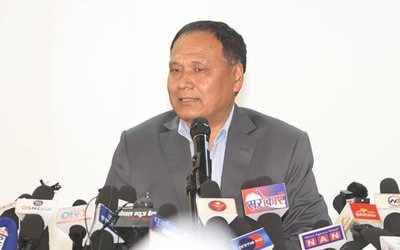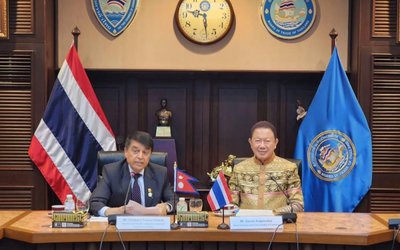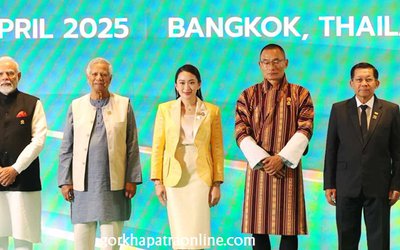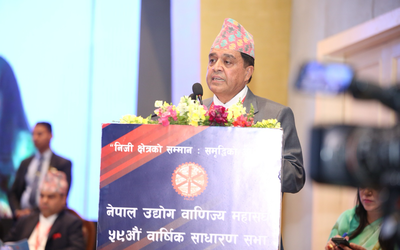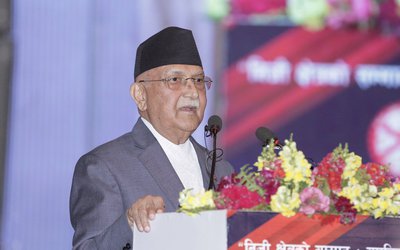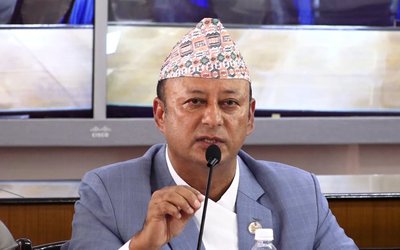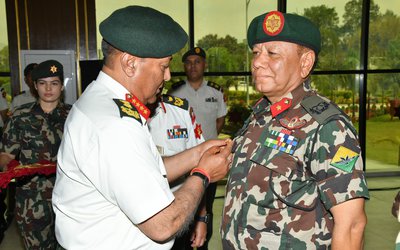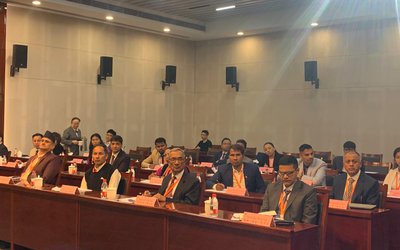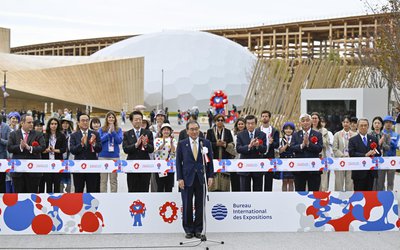
The Agritech Symposium focused on revolutionizing Nepal's agriculture sector to foster knowledge-sharing, exchange of best practices, and innovation in agricultural and rural transformation.
FAO Nepal, in collaboration with Government of Nepal, Ministry of Agriculture and Livestock Development (MoALD) and Ministry of Communications and Information Technology (MoCIT) and United Nations Capital Development Fund (UNCDF) organized the symposium to explore the potential of digitalization in revolutionizing Nepal's agriculture sector.
The inauguration ceremony of the Agritech Symposium was graced by esteemed guests, including Dr Govinda Prasad Sharma, Secretary of the Ministry of Agriculture and Livestock Development (MoALD), Krishna Bahadur Raut, Secretary of the Ministry of Communication and Information Technology (MoCIT), Dr Deepak Kharal, Secretary of Ministry of Agriculture and Livestock Development (MoALD), Prof Dr Sharada Thapaliya, Registrar of Agriculture and Forestry University (AFU), Ken Shimizu, FAO Representative for Bhutan and Nepal, and Mark Henderson, Acting Director of USAID.
Sabnam Shivakoti, Joint Secretary of the Ministry of Agriculture and Livestock Development (MoALD), delivered the welcome address and presented on "Agricultural Interventions in Digital Nepal Framework: Status and Way Forward." She shared key highlights on the digital agricultural landscape in Nepal, including government and private sector initiatives and the Digital Nepal Framework 2019.
Shivakoti elaborated on the various efforts made to promote digitalization in the agricultural sector, emphasizing the importance of leveraging digital technologies to enhance the efficiency and effectiveness of agricultural practices in Nepal.
Dr Govinda Prasad Sharma, Secretary of the Ministry of Agriculture and Livestock Development (MoALD), underscored the significance of technology in the agriculture sector and its potential to revolutionize food production and address the challenges posed by climate change, land degradation, and diseases.
Dr. Sharma highlighted the need to harness digital solutions, such as drones, apps, and weather and pest surveillance initiatives, to enable farmers to make informed decisions and adopt precision agriculture practices. He reiterated the commitment of MoALD to promote and support the adoption of technology in agriculture to drive positive change in Nepal's agricultural landscape.
Krishna Bahadur Raut, Secretary of the Ministry of Communication and Information Technology (MoCIT), highlighted the positive impact of digitalization on the agriculture sector, including enhancing farmers' access to markets and bridging the gap in the middle layer of the agricultural value chain. He reaffirmed MoCIT's commitment to promoting and supporting digitalization in agriculture as a key driver for the overall development and growth of the sector in Nepal.
Ken Shimizu, FAO Representative for Bhutan and Nepal, shared valuable insights during the program, emphasizing the growing importance of advanced digital technology in addressing the challenges of climate change and feminization in agriculture. He highlighted the potential of digital technology in boosting productivity, enhancing transparency, improving management efficiency, and enabling smart marketing in the agricultural sector. Mr. Shimizu further emphasized the empowering effect of digital technologies such as remote sensing, precision farming, and e-commerce platforms, in driving sustainable agricultural development in the country.
Sharda Thapaliya, registrar from Agriculture and Forestry University (AFU), emphasized the significance of digitalization in various aspects of agriculture, including human resource management, education sector, and market-driven curriculum development. Ms. Thapaliya stressed the significance of collaborative efforts among stakeholders to drive digitalization in agriculture and unlock its full potential. By working together, stakeholders can foster innovation, efficiency, and sustainable growth in the agriculture sector, ultimately benefiting farmers, consumers, and the broader agricultural ecosystem.
Mark Henderson, representing USAID, emphasized the vital role of traceability in agriculture for enhancing transparency, sustainability, and consumer confidence in agricultural products. He highlighted how technological innovations are driving efficiency and productivity in agriculture. Mr. Henderson emphasized that fostering collaborative partnerships between the government and private sector in Nepal can facilitate the digitalization of farming services, yielding positive outcomes for the agriculture sector as a whole.
During the symposium, three prominent presenters - Mr. Thomas Kurian from UNCDF, Anita Mahat from USAID, and Mr. Gerard Sylvester representing FAO Headquarters - highlighted the crucial role of digitizing the agriculture value chain, fostering multi-stakeholder collaborations, and driving innovation to effectively address challenges and unlock the full potential of digital technology in agriculture.
The Agritech Symposium emphasized the need for government policy interventions, digital platforms, R&D support and collaboration with startups, market linkages, financing models, and gender-inclusive approaches for agricultural digitalization in Nepal. Stakeholder collaboration, government policies, capacity building, and public-private partnerships were highlighted as crucial elements to create a conducive environment for sustainable agricultural development, benefiting small farmers.
The symposium included panel discussions on digitalizing Nepal's agricultural sector, fostering financial inclusion through digital financial services, and building a sustainable digital agriculture ecosystem. Key discussions emphasized the importance of government policy interventions, regulatory frameworks for data privacy and cyber security, and standards for digital platforms and services. Creating a conducive environment for agricultural digitalization through collaborative efforts between the public and private sectors was highlighted as crucial for sustainable development.
The panelists also underlined the importance of promoting digital skills among farmers and other stakeholders. These programs can provide farmers with the necessary knowledge and skills to effectively utilize digital tools in their farming practices, enabling them to maximize the benefits of these technologies. This includes access to finance, credit, and digital payment promotion, which can contribute to improved agricultural productivity and sustainability.
The Agritech Symposium in Nepal served as a significant platform for over 350 stakeholders to come together and deliberate on the potential of digitalization in transforming the country's agriculture sector. Through knowledge-sharing, best practice exchange, and collaboration, the symposium paved the way for a more digitally-enabled and sustainable agriculture sector in Nepal. The recommendations and outcomes of the symposium are expected to serve as a guiding roadmap for future initiatives in agricultural digitalization, driving positive changes in Nepal's agriculture sector and benefiting farmers and other stakeholders alike.
- COAS General Sigdel Decorated Medical Personnel of Nepal Army Returned From Myanmar
- Apr 13, 2025
- Dozens Police Personal Injured In Violent Clashes In Birgunj
- Apr 13, 2025
- Maoist Center and Chinese Communist Part Leaders Meet in Chongqing, China
- Apr 13, 2025
- World Expo 2025 Osaka kicks off Sunday
- Apr 13, 2025
- Weather Forecast: Brief Rain With Thunder Storms In Many Parts of Nepal Including Kathmandu, Pokhara and Biratnagar
- Apr 13, 2025
